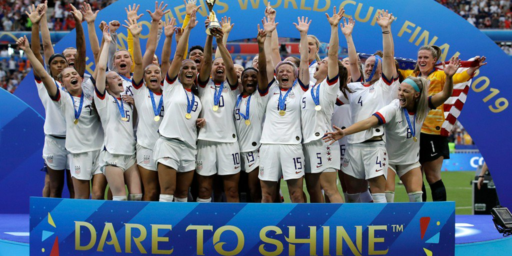World Cup’s Inconvenient Scheduling
Slate’s Daniel Gross points to yet another reason why soccer will never catch on as a major spectator sport in America: The scheduling of World Cup games.
Unlike the Olympics, the World Cup is not scheduled or televised according to U.S. preferences—the last time the quadrennial tournament was staged in the Western hemisphere was 1994. To watch the United States’ opening game in the 2002 World Cup, I had to go to the Irish pub across from my New York apartment at 4 a.m. This year the schedule is only slightly better: this Saturday against England at 2:30 p.m. ET, Friday, June 18, against Slovenia at 10 a.m. ET, then Wednesday, June 23, at 10 a.m. ET, against Algeria. Yes, pubs and sports bars will be showing the games. But how many people will leave work, or take the day off, or skip the Little League game or pool party, to sit indoors and watch a soccer match? My guess is that when the U.S. plays England, the bars in New York and Los Angeles will be like Condé Nast in the 1990s—overrun with Brits.
That’s a legitimate problem. The World Cup is a tremendous platform — easily the world’s foremost sporting event — but it’s the proverbial tree falling in a forest from a U.S. perspective. If Team USA goes deep enough, people will likely find a way to watch. But that’s not the same thing as watching every game as the event unfolds.
via Andrew Sullivan







The same thing happens, of course, when the Olympics are scheduled in someplace like Sydney or Beijing.
The difference, of course, is that the Americans audience for gymnastics is probably larger than the audience for soccer.
Americans are only interested in a sport when they win or are a serious contender. When they’re not, they pretend not to be interested. We’re the biggest bunch of bandwagon wannabes in the world.
On the plus side, unlike NBC’s coverage of the Olympics, interested people *can* view the matches, as they are being played, in a number of different ways. And I don’t think anybody is trying to pressure media outlets not to report on results until the matches have been shown in “prime time.”